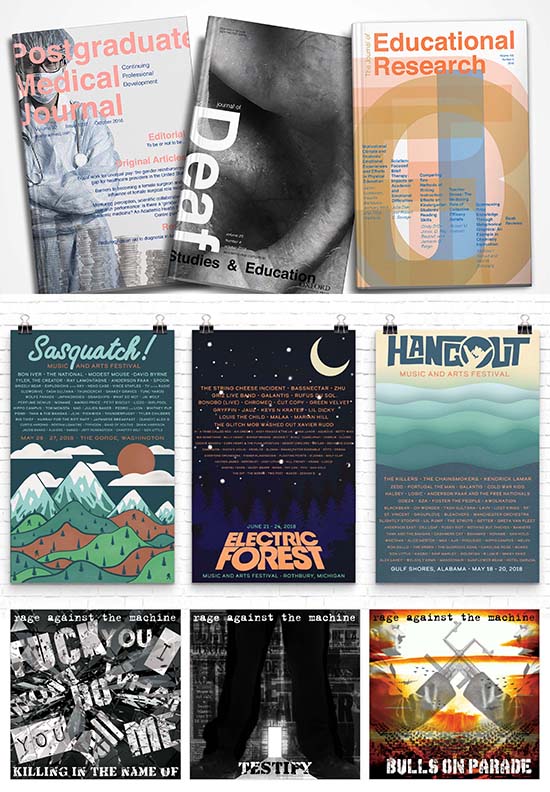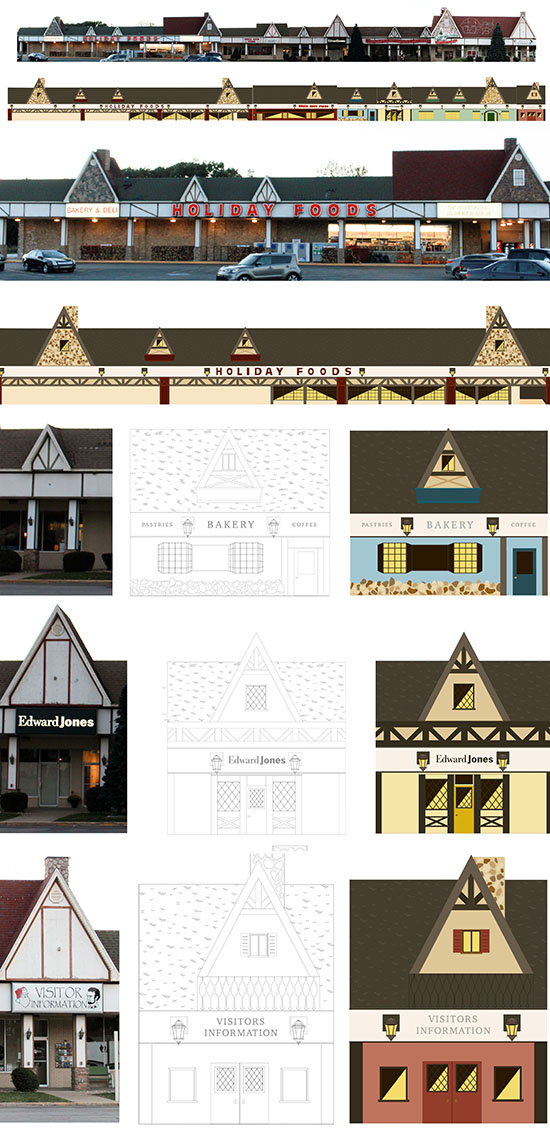| |
Indiana University Southeast - BFA Graphic Design I Aug - Dec 2018
Syllabus for a senior-level BFA Graphic Design (S452), Indiana University Southeast, New Albany, Indiana, USA for the fall semester from Aug - Dec 2018.
Download: S451 452 BA BFA GD syllabus.pdf

1st project: Social awareness + Data Visualization

Data visualization is about making information accessible for stakeholders by distilling information into a visually-based format for easy comprehension. This is usually done but not limited to a combination of illustrations, timeline, charts, bars, graphs, analogies, metaphors, and more. In our first project about data visualization, create a horizontal poster, measuring 24" x 36." As for topic to explore, pick one from the topics suggested below, which include social, environmental, political, social, environmental, political, linguistic, philosophical, and cultural issues.
Topic suggestions:
- Racism
- Poverty
- Education
- Job opportunities
- Affordable healthcare
- Equality between men and women
- Bullies in the workplace or school
- Climate change
- Endangered species
- Access to clean water
- An honest and responsive government
- And so forth...
Paige St. Germain who was a native of Flint, Michigan created a poster to craise awareness about how to help the dire situations of high levels of lead found in water supply while Tanner Spalding created a poster to highlight the percentage of America's hate crimes committed based on religious bias.

2nd project: Store Brands (Private Label Brands aka PLB)

Brand strategy is more than a logo, name or slogan. As a strategy for many retailers, store brands a.k.a. private label brands (PLBs) are a line of products of managed by a retailer to compete with others. PLBs are usually priced lower to compete with other similarly branded counterparts.
For the second project, there are two components:
i) A design refresh by picking a poorly designed product for one of these retailers: Walmart, Kroger, Meijer, Costco, Trader Joe's. For e.g. if you choose Costco's Kirkland brand, retain its logo as well as all the information on the product. Finish the design refresh by using digital mockups from the suggested list from pages 1-2.
ii) A mobile popup with a call-to-action to 'submit' or 'sign me up.' The digital mockup must show the refreshed product in the background with the retailer's name when viewing them vertically on a smartphone. The students referred to
https://wisepops.com/2018/01/16/mobile-popups-best-practices/ for tips on designing an effective popup.
Clockwise from top left: Erika Tischendorf's Cabernet Sauvignon followed by Tanner Spalding's mobile popup featuring a BOGO for Kroger's Chocolate Sandwich original cookies and a redesigned packaging and finally, Victoria Klotz's redesigned all purpose sewing kit from Coleman.

3rd project: Historical Stylizations

The students created a series of three book covers published by the same publisher. By referring to the historical periods below, derive identifiable design elements such as colors, texture, lines, typeface, and graphical or pictorial elements.
Historical Styles in chronological order:
- Victorian Graphic Design Style: 1837-1901
- Arts & Crafts Graphic Design Style:1880-1910
- Art Nouveau Graphic Design Style: 1890-1920
- Futurism Graphic Design Style: 1900-1930s
- Art Deco Graphic Design Style: 1920-1940s
- Heroic Realism Graphic Design Style: 1900-1940s
- Early Modern Graphic Design Style: 1910-1935
- Late Modern Graphic Design Style: 1945-1960
- American Kitsch Graphic Design Style: 1950s
- Swiss/International Graphic Design Style: 1940s-1980s
- Psychedelic Graphic Design Style: 1960s
- Post-Modern Graphic Design Style: 1970s-1980s
- Grunge Graphic Design Style: 2000–2010s
- Flat Graphic Design Style: 2010-Present
Source: http://www.onlinedesignteacher.com/2016/05/graphic-design-timeline.html
Top: Marissa Kress's newly reinterpreted academic journals based on Swiss styles.
Middle: Paige St. Germaine's a mix between Early Modern and Psychedelic.
Bottom: Edward Feuquay's grunge style.

4th project: Surface Patterning via XGD

The design and layout of a space can greatly affect its users. The quality of public space has always been defined by the people who use it. According to SEGD (Society for Environmental Graphic Design), Experiential Graphic Design [XGD] involves the orchestration of typography, color, imagery, form, technology and, especially content to create an environment that communicates. E.g.s of this practice that intersects between communications and the built environment, the field embraces a wide range of disciplines such as GD, architecture, interior, landscape, digital and industrial design.
The students focused on the components of graphic design by applying surface patterning to enhance a given space. We watched some videos at
https://segd.org/sites/default/files/SEGD_What_Is_XGD_LowRes.pdf
Using graphic design elements of typography and imagery, apply your understanding and recommendation to revive a to-be-determined public space using mostly pattern-centric approaches. Since this is a conceptual idea, your ideas can be presented in the form of a refined hand sketch with an accurate two-point perspective or computer generated where more realistic renderings can be performed. However, it must show three applications of the surface in the given space.
References:
What is placemaking: https://www.pps.org/article/what-is-placemaking
What is placemaking: https://segd.org/what-placemaking-and-identity
SEGD: https://segd.org/
What is Experiential Graphic Design [XGD]: https://segd.org/explore-experiential-graphicdesign
Idea suggestions:
- Wayfinding systems at an airport (for e.g.)
- Exhibitions and public art
- Retail stores
- Museums
- Residential
- Entertainment and hospitality destinations such as theme parks, hotels, casinos, sport
venues, shopping malls.
Shown here is an exploration of surface repatterning on the facade of the storefront for the town in Indiana called Santa Claus, based on its German heritage by Erika Tischendorf.

5th project: DIY (Decide It Yourself)

The final project is a broad-based approach that provides an opportunity for the students to exercise their own judgment and decision-making skills based on three options below:
Here are three options:
1. Expand one of their previous projects to include at least two pieces of touchpoints.
2. Work with an assigned or self-sourced client to produce an end result of some sort.
3. Submit to a contest. For options https://contestwatchers.com/3rd-international-contestof-the-theatrical-poster/. They are required to submit a proof of entry to complete the project.
Seen here are summative research posters based on the ideas to expand their former projects for Erika Tischendorf, Kayla Feuquay and Victoria Klotz.

|
|
YEOH AS EDUCATOR
- MY STUDENTS' CREATIONS
- MY WRITINGS
Select below to view my students' awards as well as their creations from Nanyang Technological University, Texas Tech University, and Southern Arkansas University.
|